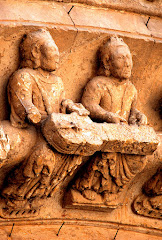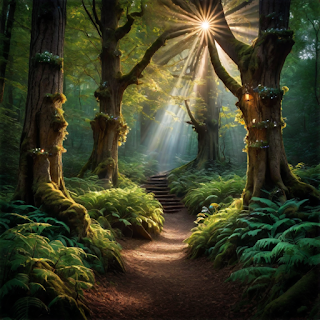Hurdy-Gurdy Evolution: Strings Across Time
Hurdy-Gurdy Evolution: Strings Across Time
The Hurdy-Gurdy has always been one of my favorite instruments, providing rich notes and chords with a continuous drone that was sure to have parties going all throughout the night for centuries. It is speculated that, "... it was the Moors of North Africa who introduced this musical instrument to Europe." (Ancient Origins, 2019). With depictions dating back to the 12th century, playing an organistrum, which would be a larger two person version of a Hurdy-Gurdy.
Gerardo Rosa, "Organistrum Colegiata de Toro (Zamora -España), s XII Pórtico Norte; retocada colores", Wikipedia, 31 Oct, 2007, https://es.wikipedia.org/wiki/Organistrum#/media/Archivo:Organistrum_Toro_P._Norte.jpg
After it's introduction the Hurdy-Gurdy found its way around Europe and, "Single player instruments developed in the thirteenth century..." (Iowa State University, 2024).
Both images provided by Iowa State University, iastate, https://www.music.iastate.edu/antiqua/instrument/hurdy-gurdy
Since it's single player innovation the Hurdy-Gurdy really hasn't changed much over the centuries, providing the same tunes that we all love to this day. Although modern technology and some excellent players have provided some interesting developments that have helped to breathe some modern style into this ancient instrument.
In this composition of Aequilibrium by Andrey Vinogradov, Oct, 25, 2018, Russia, we can hear the Hurdy-Gurdy being played in a more medieval way, giving us a window and connection to the past. Capable of providing it's own harmonics, vibrato, and continuous melody the music seems to apparate multiple instruments within itself.
Guilhem Desq, a Hurdy-Gurdy player from France, has taken this complex and rich instrument and raised it to new heights. Mixing in distortion, loops, reverb, drums, and prowess Desq uses modern technology (and all appendages) to play as a one man band. Proving that this old instrument still has a lot of life left in it! One of my favorite songs Desq performs being a cover of Cowboys From Hell - Pantera, 1990, USA.
Ultimately there hasn't been much change to the Hurdy-Gurdy's design but people like Desq are finding new ways to play it, adding to this instruments long and rich history. I only wish I could peer one hundred more years into the future to see if their efforts are keeping this flame alight.
References:
Iowa State University Department of Music and Theatre "Hurdy-Gurdy" Musica Antiqua, 7 March 2024, https://www.music.iastate.edu/antiqua/instrument/hurdy-gurdy
Ancient Origins, "Hurdy Gurdy: Rock Star of the Medieval Music Scene" Ancient Origins Reconstructing The Story of Humanity's Past, 10 July 2019, https://www.ancient-origins.net/artifacts-ancient-technology/hurdy-gurdy-was-essential-medieval-entertainment-enjoyed-merrymakers-021793
Bandcamp, "Composer Andrey Vinogradov" Aequilibrium, 14 February 2024, https://avinogradov.bandcamp.com/album/aequilibrium
Rone, "Guilhem Desq" last.fm, Wikipedia, 21 November 2017, https://www.last.fm/music/Guilhem+Desq/+wiki
Songfacts, "Cowboys From Hell by Pentera" Songfacts, 2024, https://www.songfacts.com/facts/pantera/cowboys-from-hell





Test
ReplyDeleteI love Andrey Vinogradov’s work! I haven’t heard this one before, but it’s gorgeous; I love how he adapts the medieval to the modern aesthetic. I also did research on the hurdy-gurdy for this assignment, focusing on the innovation/variation of the buzzing bridge. The Russian style that Vinogradov plays doesn’t have it (and is more elegant, in my opinion), but the French version does, and now that I know to listen for it, I could definitely hear it in Desq’s cover. It’s been described elsewhere as sounding like “someone keeping time on a kazoo,” and it usually sounds silly or fun to me, but Desq managed to make it sound metal and like a cool distortion effect. I think the context, with the drums and distortion and everything, helped blend the buzzy “kazoo” sound into the rest, and just made it sound high energy, instead of overwhelming the piece or making it sound silly. I can enjoy the percussive buzz a lot more in this context than in the traditional one!
ReplyDeleteI also did my blog post on the hurdy gurdy! I too think that the hurdy gurdy is a really cool instrument that deserves the resurgence that it has been getting in the last few years. Andrey Vinogradov has definitely made some cool hurdy gurdy music too, I think that it really fits a medieval kind of vibe. Though, the one thing that I think you should touch on a little more is how the hurdy gurdy operates, since it is such a unique instrument.
ReplyDeleteThe Hurdy-Gurdy is truly a fascinating musical instrument! It's intriguing to learn about its speculated origins being introduced to Europe by the Moors of North Africa. The continuous drone and unique sound of the Hurdy-Gurdy must have indeed added a special touch to parties and gatherings throughout history. The "Cowboys From Hell" cover certainly feels like a celebratory spectacle. The depictions of playing an organistrum in the 12th century also highlight the evolution and significance of this instrument in the musical world. Really cool instrument, and fabulous presentation. Thank you!
ReplyDeleteThe Hurdy-Gurdy holds historical significance and a distinct sound, though it's not personally a favorite. However, its role in music history and ability to unite people through its rich tones are appreciated. Performers like Guilhem Desq play a vital role in rekindling interest in the instrument, pushing its boundaries, and showcasing its versatility for modern audiences. Exploring the instrument's evolution and cultural impact, along with the connections between its sound and social contexts, could deepen understanding. Delving into the work of contemporary performers like Sarah Marie Mullen or Grégory Jolivet could offer diverse insights into the Hurdy-Gurdy's potential and relevance. Great work, Jon Snowden!
ReplyDelete